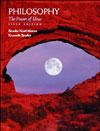

 Philosophy: The Power of Ideas, 5/e Political Philosophy Key ObjectivesUpon completing this chapter you should be able to:
|
 2002 McGraw-Hill Higher Education
2002 McGraw-Hill Higher EducationAny use is subject to the Terms of Use and Privacy Policy.
McGraw-Hill Higher Education is one of the many fine businesses of The McGraw-Hill Companies.